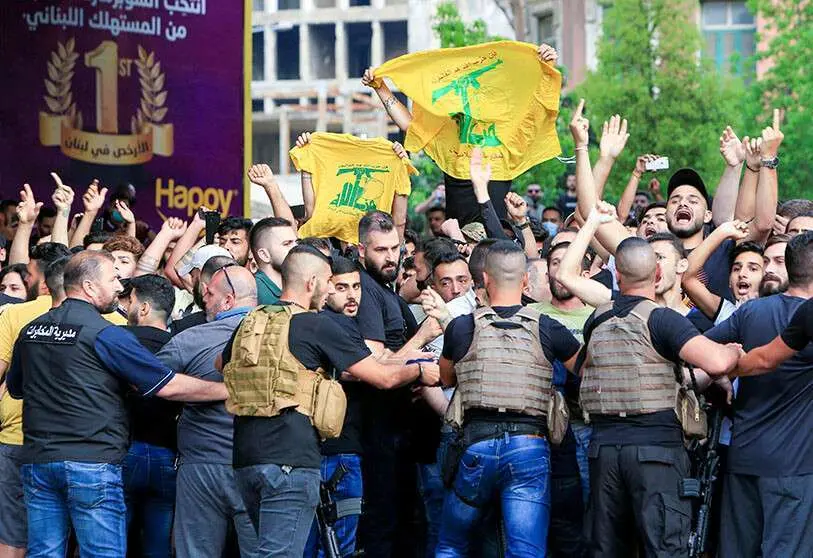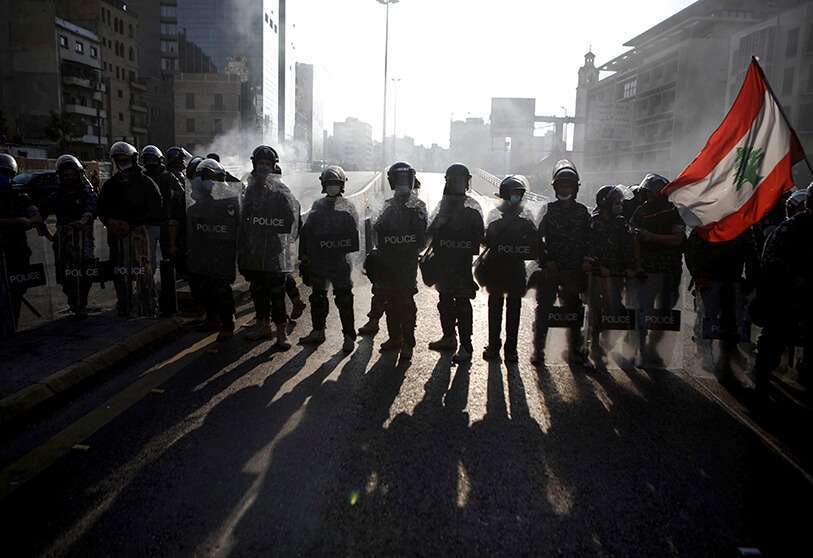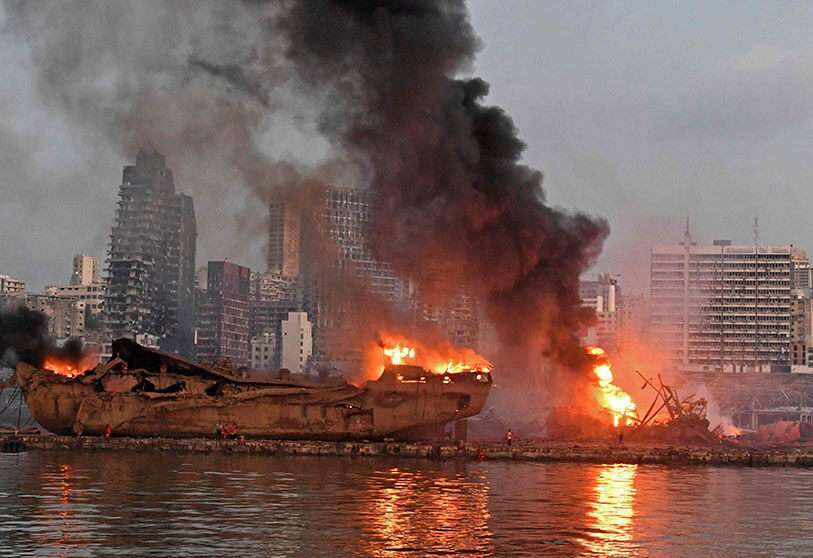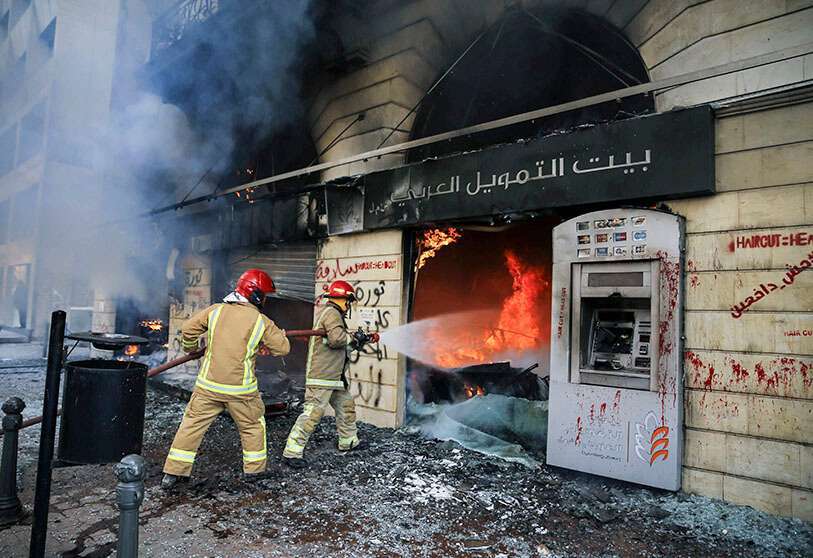Seven killed during Beirut clashes

Beirut dawned Friday in a state of uncertain calm after a pitched battle. Thursday's clashes in the capital's Tayouneh neighbourhood instilled fear and caused widespread material damage, prompting residents to rush from their homes in fear of another outbreak of violence. At least six people were killed and some 30 injured at first count, but the Lebanese Red Cross reported the death of a seventh protester on Friday.
The humanitarian organisation also warned that in the coming hours there could be more deaths among the wounded, many of whom are still in critical condition. The unusual degree of terror reached its peak with the presence of snipers on the rooftops and shootings at street level, from where even rocket-propelled grenades were fired. The scenes were reminiscent of the civil war period between 1975 and 1990 and unseen since the last outbreak of violence in 2008.
Crowds gathered on Friday in the nearby Shiite-majority suburb of Ghobeiry to mourn those killed in the attack. At the rally, attendees carried banners in remembrance of the victims. They also carried firearms, which were fired in bursts, according to Efe news agency. The demonstration demanded accountability for the snipers who opened fire on members of Hezbollah and the Amal Movement, the organisers of the demonstration, although the authorities have so far been unable to identify the attackers.
The Shiite militia had organised a demonstration on Thursday against Tarek Bitar, the investigating judge in the case of the Beirut port explosion, one of the largest non-nuclear detonations in history that killed more than 200 people, injured some 7,500 and devastated several of the capital's neighbourhoods in August 2020. However, the tension on the streets began hours earlier with the ruling of the Court of Cassation, which rejected Hezbollah's petition demanding the dismissal of the magistrate in charge of the investigation.

Bitar is continuing the investigations despite strong pressure from various Lebanese political groups. Among the elite, there is some apprehension about a possible verdict that would indict high-ranking institutional officials linked to the Amal Movement, which is close to the Hezbollah Shiite militia. So much so that the magistrate has indicted a long list of political representatives suspected of the negligence that led to the explosion.
There were some 2,750 tonnes of ammonium nitrate, a chemical compound used in both fertilisers and bombs, stored in strange conditions that the judiciary is now trying to clarify. So far, the accused have denied any responsibility for the tragic event.
Bitar would not be the first judge to be removed from the investigation. In February, Magistrate Fadi Sawan initiated the enquiry but came under intense political pressure, which led to his removal from the case. Sawan collided with the immovable subservience of the Lebanese state, characterised by a corrupt structure of rampant malfeasance and total impunity for public officials.
Friday's marches, mobilised by the Party of God and its partners, brought together hundreds of people to denounce the attack and demand accountability from the authorities. "We are facing a massacre and premeditated killings committed by the Lebanese Forces Party. They are responsible to the families of the martyrs and to all Lebanese," said Hashem Safi al-Edine, a Hezbollah leader.

An attack that arose from the profound disagreement between part of Lebanese society and Hezbollah, which is accused of maintaining a sort of state within the state that pulls the strings of national politics without being accountable and which, to top it all off, tries to obstruct justice so as not to assume responsibility for the detonation. For its part, the Shiite militia accuses the Lebanese Forces (LF), a right-wing Christian formation, of being behind the attacks.
The investigation into the case was backed from the outset by the Free Patriotic Movement, a party founded and led by President Michel Aoun, who has a Christian majority but broad Muslim support, which led to disagreements between the head of state and Hezbollah, with whom he has strong institutional ties. The causes of the explosion are a source of tension for Christian parties because, while the port explosion killed many Muslims, most of the material damage occurred in Christian areas.
The last straw, however, was Judge Bitar's issuing of an arrest warrant for former finance and public works ministers Ali Hassan Khalil and Ghazi Zaiter, profiles close to the Amal Movement and thus Hezbollah. A motive that led the charismatic leader of the Party of God, Hasan Nasrallah, to accuse Bitar of being biased and "politicised".
The magistrate has tried to question non-Shiite officials, such as then-Sunni Prime Minister Hassan Diab and Christian representative Youssef Fenianous, and although many of them have invoked their immunity as public officials to avoid the summons, they face the progress of the investigation with uncertainty. Hence, a minister close to Hezbollah declared, along with other members of the executive, that if Bitar was not dismissed immediately, they would call for a demonstration in Beirut to demand his head.

Despite the pressure, it is unlikely that the judge will resign at this stage, as the government does not have the legal capacity to dismiss him. It is likely that members of the government close to Hezbollah knew that the lawsuits would be dismissed, but their manoeuvre is to buy time until 19 October, when parliament holds a new ordinary session in which the deputies would regain their legal immunity with full guarantees.
The European Union has demanded a rapid, solid and non-interfering judicial investigation that will enable it to determine who is responsible. The UN and France urged the parties to contain the rallies to avoid an escalation of tensions, a message that the Kremlin in turn subscribed to.
Iran's position has been to the contrary. Persian Foreign Ministry spokesman Said Khatibzade condemned the clashes and denounced Israel's interference in the case in order to destabilise Lebanon. Tehran, which backs Hezbollah, did not comment on the investigation into the Beirut port explosion, but stressed the need for "the Lebanese government and authorities to identify and arrest those responsible" for the deaths of at least seven people in Thursday's incidents.









